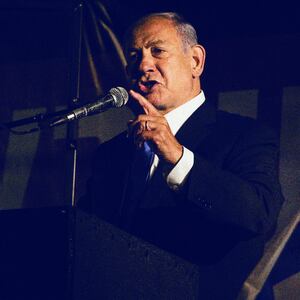For those of us within Israel who have been working for years to end Israel's occupation of the Palestinian people and their land, the rise of Benjamin Netanyahu’s ultranationalist right-wing coalition government comes as no surprise.
Successive Israeli governments have worked tirelessly for decades to entrench our military rule over the Palestinians, expand settlements, demolish homes, and progress towards annexation. At the same time, they have also worked hard to limit any real discussion on the issue by trying to place legal obstacles on the work of civil society, or delegitimizing criticism from the international community, for example by labeling organizations critical of Israel as antisemitic.
The previous Israeli government, which followed 12 years of Netanyahu rule, called itself the government of change. While it did bring some positive change for Israeli citizens on issues such as corruption and civil liberties, during its term settler violence and home demolitions in the occupied Palestinian Territories reached unprecedented heights.
That said, the newly elected Israeli government represents a whole new ballgame.
The question of occupation is not a divisive one on Israel’s current political spectrum. Traditional left and right political demarcations give way to a tripartite political map vis-à-vis the Palestinians. The majority fall into the Control camp—which believes that there is only space for one sovereign, independent and powerful state between the Jordan River and the Mediterranean Sea. That would be Israel. This camp stretches from the center-right, with the likes of Benny Gatz and Yair Lapid’s parties, all the way to parts of the Labor party.
To their right is the Annexation camp, which has grown dramatically in recent years, but has always found a stronghold on the right. They envision a “Greater Israel,” with annexation and full apartheid policies in the West Bank. In 2017 Bezalel Smotrich, the current Minister of Finance and one of the leaders of the annexation camp, detailed his plan: Palestinians will have three options. One: give up your national identity and aspirations, as well as some of your civil rights and the right to vote, and live in small Bantustan-like enclaves. Two: you will be deported. Or three: you will be classified as a terrorist, and our security forces will deal with you.
For most of Israel’s history, the political battleground has been dominated by these two behemoths. We, the Equality camp, drive a wedge in their absolute power. We believe that everyone between the River and the Sea, no matter their ethnicity, nationality or religion, must have complete equality of rights and opportunities.

Palestinians run for cover from tear gas during a protest against settlements in Masafer Yatta near Hebron, in the Israeli-occupied West Bank, January 20,2023.
Mussa Issa Qawasma via ReutersThe day before he was reinaugurated, Netanyahu published the guiding principles of his government in a Twitter thread: “The Jewish people have an exclusive and indisputable right to all parts of the Land of Israel. The Government will promote and develop settlement in all parts of the Land of Israel—the Galilee, the Negev, the Golan and Judea and Samaria.”
Despite running an election campaign focused on the cost of living, these words exposed what Netanyahu and his government care about most. In the past, Netanyahu positioned himself closer to the Control camp, talking about creating a Palestinian autonomy of sorts. No longer.
Netanyahu has planted himself firmly in the Annexation camp, making settlement expansion his top priority, and placing apartheid policies at the center of his legislative agenda right from the outset. His newly formed government represents these expansionist intentions. Today, violence is the Minister of National Security, hatred is the Minister of Finance, and those who once tried to distance themselves from these warped values now offer near-unconditional support.
This government has already shown it will stop at nothing to achieve its aims. We have seen in just the first month of its term concerted attempts to bulldoze anything that stands in its way, which is how the judicial system became first in line to be destroyed.
Despite the right’s rhetoric, Israel’s Supreme Court is no friend of the Palestinians and has been instrumental in perpetuating the occupation. Nevertheless, the government understands that in order to avoid potential upsets in achieving its annexationist agenda, it must remove any possibility of effective judicial review.

Israelis protest against Prime Minister Benjamin Netanyahu's new right-wing coalition and its proposed judicial reforms to reduce powers of the Supreme Court in Tel Aviv, Israel February 4, 2023.
Ronen Zvlun via ReutersThe threat to the judiciary’s independence has ignited the wrath of many Israelis, generating large protests every Saturday night for the past month. Israelis are rightly angered by the government’s attempts to effectively do away with any kind of checks on its power.
But the rhetoric used by the mainstream protesters has been about “saving Israeli democracy,” ignoring the fact that a democracy cannot rule over millions under military dictatorship.
This is a classic enabling move by the Control camp, effectively submitting to the narrative of the annexationists. Their ultimate goal is not dismantling the judicial system per se, but rather annexing the occupied Palestinian Territories; thus, any opposition to the measures they take shouldn’t focus solely on the means, but on their end game. Unfortunately, like many cases in modern history, the terms of the current debate within Israeli society are ruled by those who believe that “this is not the time” to talk about the occupation.
This moment represents a crucial test for our society. We must rise to the occasion and understand that the same forces which promote annexation and apartheid are the ones pushing for the destruction of the judicial system. We must realize that taking to the streets for the sake of the judicial system while protecting and legitimizing the occupation and Jewish supremacy is serving our political enemies who want Israel to complete the transition to an apartheid state.

A Palestinian shows papers during a protest against settlements in Masafer Yatta near Hebron, in the Israeli-occupied West Bank, January 20,2023.
Mussa Issa Qawasma via ReutersUnderstanding all of this is crucial in the struggle against those in power. This is because the only effective way to fight the Annexation camp is by holding to the principle of equality. We cannot remain silent on the vast majority of annexationist policies, and pick and choose what feels comfortable for us to oppose, or take action only when it is our human rights which are threatened, rather than those of our neighbors.
When the hundreds of thousands of protesters throughout Israel protest for equality, only then will we be able to put the brakes on our hurtling trajectory towards an authoritarian, apartheid regime, and move forward through the debris, building something new.
This moment must serve as a wake-up call for our society, as well as its friends in the international community. Fighting to protect the judicial system without speaking about the core underlying issues is not only morally wrong, it is also a missed opportunity to advance towards change.
Freedom and equality cannot be the privilege of the few but should be the fundamentals of a society which aspires to be democratic.
Ori Givati served in the Armored Corps of the IDF from 2010—2013 as a tank commander. Today he is the Advocacy Director of Breaking the Silence, responsible for the organization's international relations, media, and advocacy in the Knesset and around the world.









